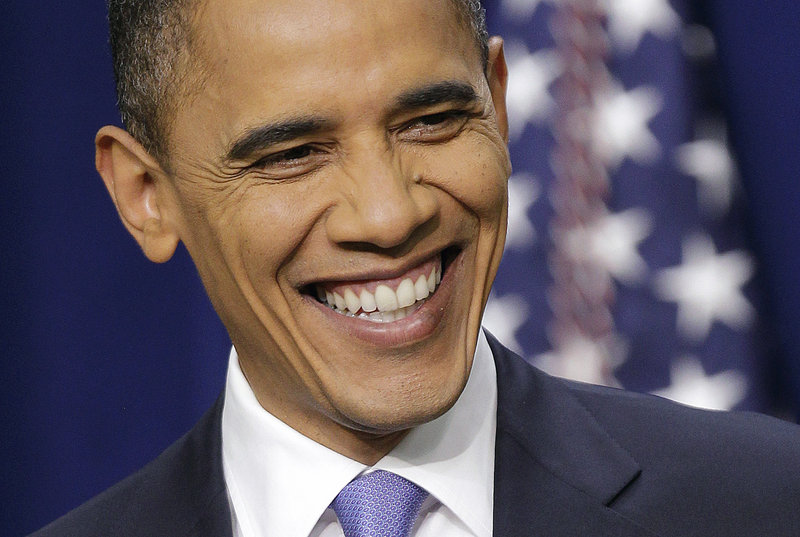WASHINGTON – Seven weeks after using the word “shellacking” to describe his political condition, President Obama left Washington for his Hawaiian vacation in a vastly different place, with a litany of legislative accomplishments and his party seizing the high ground on issues relating to civil rights, national security and the Sept. 11 attacks.
At his first news conference since the day after midterm elections, in which Republicans won control of the House, Obama said Wednesday he had heard the message of that vote: Seek common ground.
“That’s a message I will take to heart in the new year, and I hope my Democratic and Republican friends will do the same,” he said.
Bipartisan deals formed the basis of much of the legislation passed in a lame-duck session Obama called “the most productive” in decades. Hours earlier, the Senate passed the New START arms treaty by a bipartisan vote of 71-26.
That vote was preceded in recent days by bipartisan passage of other landmark legislation, including repeal of the “don’t ask, don’t tell” law affecting gays in the military, an $858 billion tax package and the largest overhaul of food safety regulations in 70 years. On Wednesday, a scaled-back bill to aid sickened Sept. 11 responders was sent to the president.
But there are doubts, in both parties, that bipartisanship will survive the new year. Obama said he was “not naive” and that there would be “tough fights in the months ahead.”
He ended the first half of his presidency on an upswing, demonstrating a mastery of the political process that eluded him for most of his term.
“Yes, we did!” the president said, beaming, as he signed a campaign promise into law to let gays and lesbians serve openly in the U.S. military. Hours later, his tarnished reputation as a world leader got a lift with Senate ratification of the New START treaty, reducing nuclear weaponry on both sides of the Atlantic.
The return of the old Obama — full of confidence, triumph and hope — buoyed formerly dispirited supporters, like those who cheered at the signing ceremony for repeal of “don’t ask, don’t tell.”
His last two years, with Democrats in charge in Congress, were “the most productive two years that we’ve had in generations,” Obama told reporters.
Now, a more reactive phase begins. With split control of Congress and a Republican House determined to undo as much of his first-term agenda as possible, the president will continue trying to cut bipartisan deals.
But politicians in both parties they are headed back to acrimony and partisan division over the next two years.
“To somehow think that, beginning next January 5, we will all love one another, and kumbaya? I don’t think so,” said Republican Sen. John McCain of Arizona in a recent speech.
Obama is confronting new obstacles that will redefine what success means for him. After pushing through his health care overhaul, he’ll now have to work to assure funding for that law, the largest piece of social legislation in 20 years.
Republicans were able to score a major victory that got little attention outside Washington. blocking a Democratic plan to fund the government through the end of next September, Republicans set the stage for a battle over the next two months that will revolve, at least in part, around a conservative plan to starve the government of new funding.
At immediate risk is money to run agencies responsible for administering changes in health care. Also up for grabs is new funding for enforcement of new financial regulations put in place to prevent a repeat of the 2008 collapse.
At his news conference, Obama signaled some of the areas where he and Republicans likely will clash, including spending for public education and college tuition aid; veterans health care; road, bridge and airport construction projects, and scientific research and development. Battles also are likely over social spending, including for aid to states for health care and nutrition for the poor.
A number of major Obama initiatives, such as a sweeping immigration overhaul, a cap-and-trade system to control pollution and closing the detention center at Guantanamo Bay, Cuba, are all but moribund for the remainder of his term.
The president described the recent defeat of the Dream Act, which would have provided a path to legal status for undocumented young people, as “maybe my biggest disappointment.” He also mentioned his disappointment over the failure of a measure promoting collective bargaining for public-safety workers.
There are prospects for progress on matters where Republicans appear willing to engage.
“It’s easy to forget how factionalized Republicans are,” said John J. Pitney Jr., a government professor at Claremont McKenna College in California who once worked for House Republicans. “It’s only when they gain some power that the dividing lines come into bold relief.”
Republican leaders will have to satisfy a new, more hard-line conservative element in Congress eager to cater to the demands of “tea party” activists. That could give Obama an opportunity to peel away the votes of moderate Republican lawmakers or those more interested in protecting local interests.
Send questions/comments to the editors.



Comments are no longer available on this story